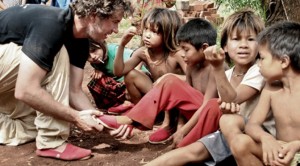
After reading the class prep regarding the one-for-one business model, I was skeptical about its effectiveness towards the individuals that are aided. Browsing through YouTube, I found a video that made me even more dubious.
I am opposed to the one-for-one business model (in terms of its capability to aid the individuals that receive free products and not in regards to its success as a marketing campaign) because, in most cases, its effects on the local economy usually outweigh the positive impact of giving away free goods. Toms, for example, destroys the shoe producing industry in the countries where it gives out free shoes due to their free and inconsistent supply of one-for-one loafers. In addition, Teddy Ruge, founder of Raintree Farms, discusses in the aforementioned video that shoes are most of the times not a significant problem in the countries were Toms gives aid. He argues that a tactic referred to as “poverty porn” is used, in which one-for-one businesses show in their ads the most extreme poverty situation in order to generalize the country they are aiding.
To help businesses in developing countries, I suggest that firms produce their goods in these countries and pay their workers relatively high wages. This way, individuals will have a job and disposable income to fuel the economy. Firms, analogously, will portray social responsibility to their consumers and can therefore charge a higher price for their goods to account for their higher wage costs.